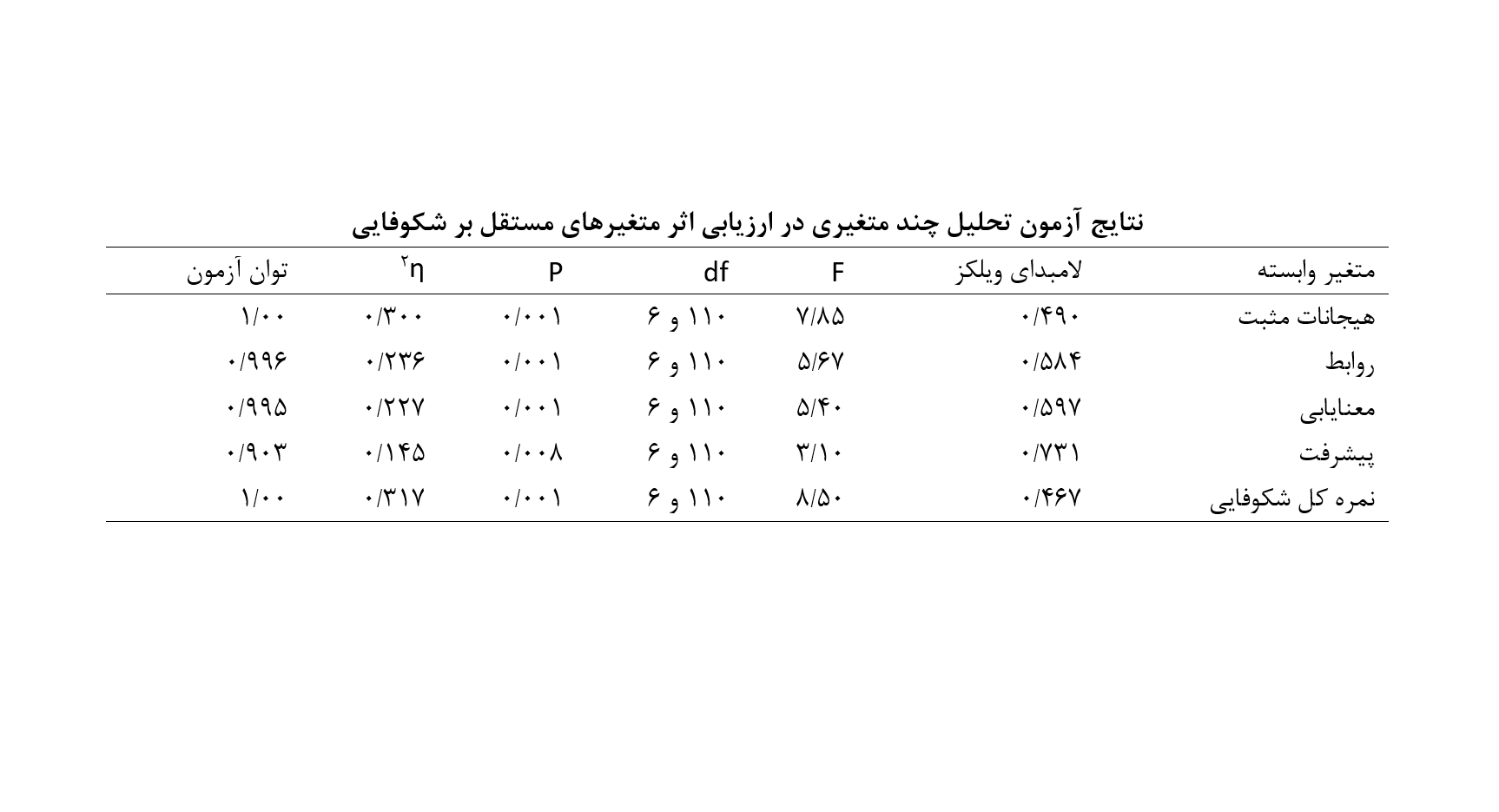Comparing the Effectiveness of Positive Psychology Therapy, Acceptance and Commitment Therapy (ACT), and Their Combination with Mystical Teachings on Flourishing in Teachers
Keywords:
Flourishing, Positive Psychology Therapy, Acceptance and Commitment Therapy (ACT, Mystical Teachings of Rumi, TeachersAbstract
This study aimed to compare the effectiveness of Positive Psychology Therapy, Acceptance and Commitment Therapy (ACT), and their combination with the mystical teachings of Rumi on the flourishing of female high school teachers in Tehran. This research was conducted using a causal-comparative design. The statistical population consisted of all female high school teachers in public schools in Tehran during the 2022-2023 academic year. A multi-stage random sampling method was used, and 68 teachers voluntarily participated in the study. They were randomly assigned to three experimental groups and one control group. The experimental groups received Positive Psychology Therapy, ACT, or a combination of both therapies enriched with the mystical teachings of Rumi. Each group participated in 8 sessions of intervention, while the control group received no intervention. Data were collected using the Flourishing Questionnaire (FQ) and analyzed through repeated measures ANOVA. The results indicated that all three interventions had a positive effect on increasing the teachers' flourishing. However, the combination of ACT and Positive Psychology Therapy with the mystical teachings of Rumi had a greater impact on flourishing compared to the other groups. This combined approach was particularly effective in enhancing positive emotions, commitment to values, and meaning in life. The findings of this study suggest that integrating psychological and spiritual teachings can serve as an effective strategy for enhancing psychological flourishing and improving the quality of life for teachers. This combined therapeutic approach is proposed as a novel model that can be implemented in educational and therapeutic settings.
Downloads
References
Seligman MEP, Csikszentmihalyi M. Positive Psychology: An Introduction. In: Csikszentmihalyi M, editor. Flow and
the Foundations of Positive Psychology: The Collected Works of Mihaly Csikszentmihalyi. Dordrecht: Springer Netherlands;
p. 279-98.
Boehm JK. Positive psychological well-being and cardiovascular disease: Exploring mechanistic and developmental
pathways. Social and Personality Psychology Compass. 2021;15(6):e12599.
Hayes SC, Levin ME, Plumb-Vilardaga JC, Villatte JL, Pistorello J. Acceptance and Commitment Therapy and
Contextual Behavioral Science: Examining the Progress of a Distinctive Model of Behavioral and Cognitive Therapy. Behavior
Therapy. 2013;44(2):180-98.
Hayes SC, Luoma JB, Bond FW, Masuda A, Lillis J. Acceptance and Commitment Therapy: Model, Processes and
Outcomes. Behaviour Research and Therapy. 2006;44(1):1-25.
Bilgrave DP, Deluty RH. Religious Beliefs and Therapeutic Orientations of Clinical and Counseling Psychologists.
Journal for the Scientific Study of Religion. 1998;37(2):329.
Bohlmeijer ET, Lamers SMA, Fledderus M. Flourishing in People With Depressive Symptomatology Increases
With Acceptance and Commitment Therapy. Post-Hoc Analyses of a Randomized Controlled Trial. Behaviour Research and
Therapy. 2015;65:101-6.
Batievsky D. Ketamine-Assisted Psychotherapy Treatment of Chronic Pain and Comorbid Depression: A Pilot Study
of Two Approaches. Frontiers in Pain Research. 2023;4.
Arch JJ, Eifert GH, Davies CD, Vilardaga JCP, Rose RD, Craske MG. Randomized Clinical Trial of Cognitive
Behavioral Therapy (CBT) Versus Acceptance and Commitment Therapy (ACT) for Mixed Anxiety Disorders. Journal of
Consulting and Clinical Psychology. 2012;80(5):750-65.
Utami TW, Astuti YS. Effectiveness of Acceptance and Commitment Therapy on Anxiety in Hypertensive Patient.
Indonesian Journal of Global Health Research. 2020;2(1):7-14.
Saleh AAD, Badizadeh MS. The Basic Function of Happiness and Vivacity From Rumi's Point of View. Propósitos
Y Representaciones. 2021;8(SPE3).
James E, Robertshaw TL, Hoskins M, Sessa B. Psilocybin Occasioned Mystical‐type Experiences. Human
Psychopharmacology Clinical and Experimental. 2020;35(5).
Garcia-Romeu A, Davis AK, Erowid E, Erowid F, Griffiths RR, Johnson MW. Persisting Reductions in Cannabis,
Opioid, and Stimulant Misuse After Naturalistic Psychedelic Use: An Online Survey. Frontiers in Psychiatry. 2020;10.
Griffiths RR, Johnson MW, Carducci MA, Umbricht A, Richards WA, Richards BD, et al. Psilocybin Produces
Substantial and Sustained Decreases in Depression and Anxiety in Patients With Life-Threatening Cancer: A Randomized
Double-Blind Trial. Journal of Psychopharmacology. 2016;30(12):1181-97.
Ko K, Knight G, Rucker J, Cleare AJ. Psychedelics, Mystical Experience, and Therapeutic Efficacy: A Systematic
Review. Frontiers in Psychiatry. 2022;13.
DeBonis K. Revisiting Psychiatry’s Relationship With Spirituality. Frontiers in Psychiatry. 2024;15.
Bordbari S, Mousabeygi T, Zare H. Prediction of Marital Commitment based on Flourishing, Self-Compassion and
Cognitive Emotion Regulation Strategies in Nurses. arumshcj. 2022;24(1):28-39.
Ryff CD, Singer B. Interpersonal flourishing: A positive health agenda for the new millennium. Personality and Social
Psychology at the Interface: Psychology Press; 2014. p. 30-44.

Downloads
Published
Submitted
Revised
Accepted
Issue
Section
License
Copyright (c) 2024 Journal of Study and Innovation in Education and Development

This work is licensed under a Creative Commons Attribution-NonCommercial 4.0 International License.










